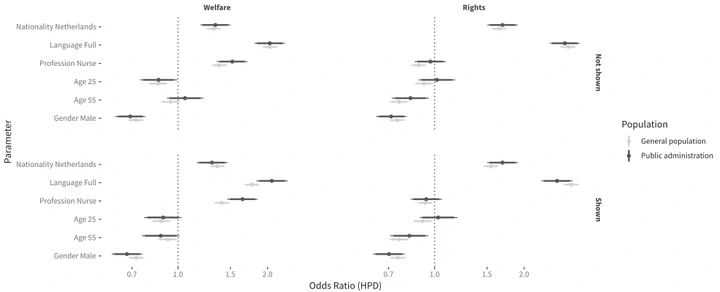Differential discrimination against mobile EU citizens: experimental evidence from bureaucratic choice settings
 Expected effects on the prioritization of different profiles.
Expected effects on the prioritization of different profiles.
Abstract
EU citizens have rights when living in a member state other than their own. Bureaucratic discrimination undermines the operation of these rights. We go beyond extant research on bureaucratic discrimination in two ways. First, we move beyond considering mobile EU citizens as homogenous immigrant minority to assess whether EU citizens from certain countries face greater discrimination than others. Second, we analyse whether discrimination patterns vary between the general population and public administrators regarding attributes triggering discrimination and whether accountability prevents discrimination. In a pre-registered design, we conduct a population-based conjoint experiment in Germany including a sub-sample of public administrators. We find that (1) Dutch and fluent German speakers are preferred, i.e., positively discriminated, over Romanians and EU citizens with broken language skills, that (2) our way of holding people accountable was ineffective, and that (3) in all these regards discriminatory behaviour of public administrators is similar to behaviour of the general population.
Post-Print / Accepted Manuscript
The open access version of the accepted manuscript.
Online appendix
The online appendix contains an extension of the procedures and results presented in the paper; the JAGS code for the statistical model, and the ggmcmc output for convergence diagnostics of the model parameters.
Code and replication material
The code for producing the results of the paper is available in the replication report:
Available as:
- PDF (673 Kb, 54 pgs), containing the main report in PDF with all the code.
- HTML (2.9 Mb), containing the main report in HTML with all the code.
Dataset
The dataset with the experimental data is available as a local csv file, at the OSF and can also be directly loaded in R with the following code:
url <- "http://xavier-fim.net/publication/journal-european-public-policy-2021-differential-discrimination-against-eu-mobile-citizens/jepp-2020-0177.csv"
d <- read.table(url, sep = "\t", header = TRUE)
The dataset contains 90,072 observations for 13 variables.
Each observation is a decision made by each of the individuals sampled (id).
Variables included in the dataset.
-
id: identifier of the individual.
-
Population: either belonging to the sample fo “General population” or “Public administration”.
-
Treatment: having received the treatment or not.
-
Outcome: responso to either “Social” or “Rights”
-
Exercise: number of exercise performed by the individual sampled.
-
ProfileOrder: whether the profile is the first or the second shown.
-
Nationality: “Netherlands” or “Romania”
-
Gender: “Female” or “Male”
-
Language: “No” or “Full”
-
Profession: “Doctor” or “Nurse”
-
Age: “25”, “40” or “55”
-
Decision: the binary indicator whether the profile has been prioritized (1) or not (0).
Pre-registration
The pre-registration is available at the Center for Open Science.
Figures
The figures in the journal are quite small, and are reproduced here in high quality vectorial formats (SVG is shown, and pdf is available below):
Figure 2
Figure 3